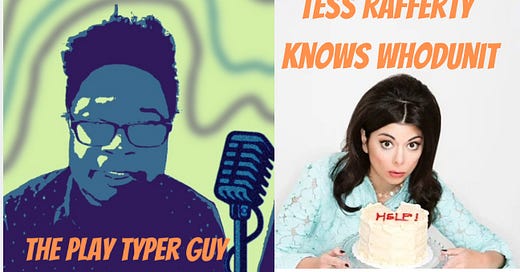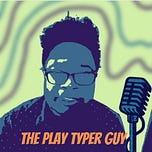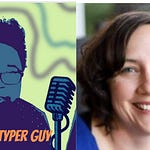Joining me today is actor, writer, and comedian
. We discuss her wonderful Kat Kelly mystery series and how mysteries can provide a much-needed escape and catharsis during America’s slow creep toward fascism.Tess has her own newsletter here on Substack,
, which you should check out.Below are transcribed excerpts of our conversation. Hope you enjoy.
SER: I love your Kat Kelly mystery novel series. You had written something [at
that stood out to me because I think it spoke to what I like about mysteries and what we are experiencing now. I’ll just read it real quick:I find watching a murder mystery incredibly satisfying in our uncertain times. There is an agreement between the show and the viewer that at the end of the program you will get an answer to the question “Who done it?” and the bad guy will see justice. It’s incredibly cathartic when you’re living in a time short on answers and you’re watching as so many men, including one who may be President again, skirt the law.
TESS RAFFERTY: When I was pitching the Kat Kelly series … it was under option by Warner Brothers, probably around 2017, 2018, so we were very much in the middle of the Trump administration.
Like you, I'm a huge lover of mysteries and I always have been. One of the things I thought about was, if we go back to the early aughts when we were all much younger and going out at night, and I was doing standup in Los Angeles. I would go out to do shows or see shows or sometimes just go out with friends.
We didn't have streaming like we do today. And A&E was running Law & Order four times a day. Everybody’s doing jokes about Law & Order because everybody’s watching it when you're getting ready to go out and it’s on when you come home at night and you’re having your sandwich before you go to bed because you want to soak up your alcohol or whatever.
So I thought about that and my love of mysteries, which was really the only thing I could read at the time [after Trump was elected.] It’s escapism, right?
A lot of mysteries take place in different locations, and the Agatha Christie genre is, of course, the fancy people and fancy hotels, but it is also that comfort of they got this. By the end of this hour, you’re going to find out who did it. So you don't have to be anxious the whole time, like with some of the TV shows that we watch where it’s week to week and they're never going to catch who did it. Even if they do, it’s not going to matter, that sort of anxiety porn that’s very popular now.
SER: I loved the Kinsey Milhone books when I was a kid — the hardboiled detective. I think your stuff is in line with that, but also there’s a romanticism and the fun and the lightness while also having the dark scenario of where, you know, someone dies.
TESS: People are dying! I wanted something like Moonlighting or Heart to Heart or Nick and Nora, you know, the old Thin Man series. Because I want that escape for me personally. I’ve read a lot of different mystery books and I got to a point again, probably in the Trump years where I [couldn’t] read another woman not being believed book.
It’s The Girl On The Train and The Woman In Cabin 10 and the on and on and on. There’s always a woman who knows what’s going on and everyone thinks she’s crazy or she’s an alcoholic or whatever. “Are you on your medication?”
I can’t read this one more time because we’re living it every day. I wanted a story where the woman’s empowered and you believe her.
SER: You wrote, not long after the 2016 election outcome, Aftermath. I'll drop the link to that in here.
You drew a line that things are never going to be the same. People made a choice that you can’t really come back from. They sided with racism and misogyny. Yet people kept making that choice. There are a lot of people who made it in 2020 again, and now there’s the risk that a lot of people might still make it in 2024. Well, white people, I should say.
TESS: Sorry.
SER: Specifically white men.
How shocking was [the 2016 election]? Connecting it back to a mystery. Was it a sense of “fair play,” like you suspect going through the election that [Hillary] Clinton was going to lose and Trump would win and this is what America is. Or was it more “wait of minute, this person was the killer? That doesn’t make any sense.
TESS: I was fortunate for one reason, and this is funny to talk about now that we’ve lived through a global pandemic because this is behavior you wouldn’t do now. Well, some people would, Republicans would. Anyway, I had had a fever for about three days. I had been really sick. I don’t run fevers often. It was well over 100. I was throwing a party.
I had one of those secret Hillary groups where we were all getting beat up online by Bernie [Sanders] supporters and Republicans. So we started a secret group online. It was like 4,000 members before we had to cut off membership because it was just getting too crazy.
We had a strong community here in Los Angeles, so I'm going to throw a party. Hopefully she’ll win — without really thinking about what it would be like if she didn’t win.
The day of the election, I told myself I was feeling better and I wasn't. I was just kidding myself. I thought, “No, no, I’m on the mend. Tess, you have to see this through. You’ve got all these people coming to your house tonight. You can’t cancel.”
Then somewhere that evening, three things became apparent. [Hillary] was losing. I wasn’t really better, and I had about 60 people in my house, who were all now the most depressed people on the planet.
There was one person who was among the last people to leave. She was a woman who I didn’t know. She had come with someone who had come with someone, and the people she’d come with had already left. She’s on her way out the door with the last stragglers, and I hear her say to whoever she’s leaving with, “I don't know anyone here. I just didn’t want to go home and be alone.”
I spent the next day very much kind of numb and in shock and still very much with a fever. I got to sleep pretty much through the whole next day of, which was a little bit like taking a pill in a sense to not feel sick from just the profound sadness and devastation of it.
Did [Clinton’s loss] catch me off guard? Was it a surprise? I don’t think it was a huge surprise because I think we knew, we saw the misogyny, right? We saw the disinformation unfolding.
I don’t know if you had this experience, but every black friend I knew was like, “We could have told you this was going to happen.”
I couldn’t be shocked because I had seen so much of the misogyny coming out, but I also saw a lot of the enthusiasm [for Clinton], which never got reported.

















Share this post